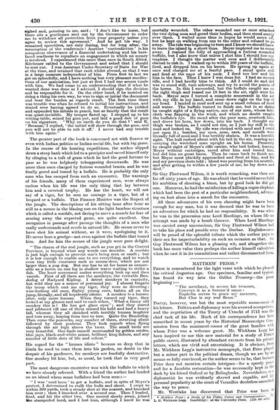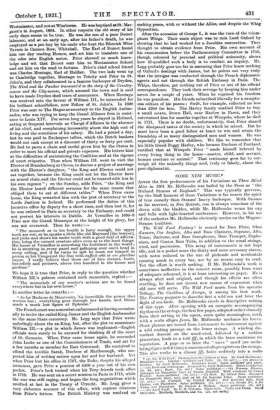MATTHEW PRIOR.* Patton is remembered for the light verse with
which he pleased the critical Augustan age. One specimen, familiar and typical,
has found its way into the Golden Treasury—the poem
beginning :- " The merchant, to secure his treasure, Conveys it in a borrow'd name : Euphelia serves to grace my measure, But Cleo is my real flame."
Poetry, however, was but the most reputable amusement of his leisure. Politics and diplomacy were his avowed occupations, and the negotiation of the Treaty of Utrecht of 1713 was the chief task of his life. Much of his correspondence has been unearthed in recent years by the Historical Manuscripts Coin•
mission from the muniment-rooms of the great families with whom Prior was a welcome guest. Mr. Wickham Legg has been inspired to use this new material for a study of Prior s public career, illustrated by abundant extracts from his private letters, which are vivid and entertaining. It is obvious, from Mr. Wickham Legg's instructive monograph, that Prior played but a minor part in the political drama, though we are by no means so fully convinced, as the author seems to be, that became Prior does not mention certain intrigues—for a speedy Peace and for a Jacobite restoration—he was necessarily kept in the dark by his friend Oxford or by Bolingbroke. Nevertheless, as 3
diplomatist he was evidently shrewd and capable, and his personal popularity at the court of Versailles doubtless smoothed the way to peace.
Mr. Westlake has discovered that Prior was born in • martaeo Prior: Is Study of he Public Career and correspondexa. nJ L. G. Wickham. Legg. Cambridge : at the llatvenity Press. [2. Bd. 'ii.,
Westminster, and notat Wimborne. He was baptized atSt. Mar- garet's in August, 1664. In other respects the old story of his
early days seems to ha true. He was the son of a poor Dorset labourer, and at an. early age, after his father's death, he was' employed as a pot-boy by his uncle who kept the Rhenish. Wine Tavern in Cannon Row, Whitehall. The Earl of Dorset found
him one day reading Horace, and set him to translate one of the odes into English metre. Prior showed sa much know- ledge and wit that. Dorset sent him to Westminster School and set him on the road to fortune. Prior's chief school friend
was Charles. Montagu, Earl of Halifax.. The two lads went up to Cambridge together, Montagu to Trinity and Prior to St. John's, and they collaborated in a famous burlesque of Dryden, The Hind and the Panther trar.svered to the story of the Country- mouse and the City-mouse, which amused the town and is said to have made Dryden shed tears of annoyance. When Montagu was received into the favour of William III., he interceded for his brilliant schoolfellow, now Fellow of St. John's. In 1690 Prior was sent to The Hague as secretary to the English Ambas- sador, who was trying to keep the Grand Alliance firm in resist-
ance to Louis KW. For seven long years he stayed in Holland, acting at frequent intervals as Chargé d'Affaires in the absence of his chief, and complaining incessantly about the high cost of living and the scantiness of his salary. He had a pound a day, but he was paid in Exchequer tallies, which the Dutch bankers would not cash except at a discount of thirty or forty per cent. He had to pawn a chain and medal given him by the States in order to meet his official and private expenses. His letters hint at the difficulties of maintaining the Coalition and at the rigours of court etiquette. Thus when William III. went to visit the Elector of Brandenburg at Cleves, to discuss e, project of marriage with the Elector's daughter, " the King and Elector could not eat together, because the King could not let the Elector have an armed chair, and the Elector could not be treated with less in his own regence " ; on the Sunday, adds Prior, " the King and the Elector heard different sermons for the same reason that obliged them to eat at different tables." When Prior came home, the King rewarded him with the post of secretary to the Lords Justices in Ireland. He performed the duties of this lucrative office by deputy for a short time, and then lost it, for he was ordered to Paris as secretary to the Embassy, and could not protect his interests in Dublin. At Versailles in 1698-9 Prior saw the Grand Monarque at the height of his glory, but was not overawed. Thus he wrote :—
" The monarch as to his health is lusty enough, his upper teeth are out, so he.speaks a little like old Maynard [the lawyer], and picks and shows his under teeth with a good deal of affecta- tion, being the vainest creature alive even as to the least things. His house at Versailles is something the foolishest in the world ; he is strutting in every panel and galloping over one's head in every ceiling, and if he turns to spit he must see himself in person or his Vicegerent the Sun with sufficit orbi or nec plurilms impar. I verily believe that there are of him statues, busts, bas-reliefs and pictures, above two hundred in the house and gardens."
We hope it is true that Prior, in reply to the question whether William III.'s palaces contained such memorials, replied :-
" The memorials of my master's actions are to be found everywhere but in his own house."
In another letter he remarks :— " As for Madame de Maintcnon, 'tis incredible the power that woman has ; everything goes through her hands, and Diana made a much less figure at Ephesus."
The French court was somewhat embarrassed at having occasion- ally to invite the exiled King James and the English Ambassador to the same State ceremony. Mr. Legg says that Prior wrote unfeelingly about the ex-King, but, after the plot to assassinate
William III.—a plot in which James was implicated—English officials were surely to be excused for thinking ill of the court of St. Germain. When Prior came home again, he succeeded John Locke as one of the Commissioners of Trade, and sat for a few months as member for East Grinstead. He contrived to offend the terrible Sarah, Duchess of Marlborough, who sus- pected him of writing satires upon her and her husband. Yet when Prior lost his office in 1707, the Duke, despite his alleged meanness, gave Prior a pension of £400 a year out of his own pocket. Prior's luck turned when his Tory friends took office in 1710. He was sent on a secret mission to Paris in 1711, while the war was still raging, and began the long negotiations which resulted at last in the Treaty of Utrecht. Mr. Legg gives a very elaborate account of this affair, with copious citations from Prior's letters: The British Ministry was resolved on
• making peace,. with or without the. Allies, and despite the Whig Opposition.
After the accession of George L, it was the turn, of the trium- phant Whigs. Their main object was, to ruin Lord Oxford by showing that he had worked for a. Jacobite restoration. They thought to obtain evidence from Prior. His own account of his examination before the Parliamentary Committee in 1715, though coloured by personal and political animosity, shows how ill-qualified such a body is to conduct an inquiry. Mr. Legg probably goes too fE;r in assuming that Prior knew nothing of Oxford's dealings with James, but he points out very truly that the intrigue was conducted through the French diplomatic agents and not through the British Embassy in Paris. The Whigs, therefore, got nothing out of Prior or out of his official correspondence. They took their revenge by keeping him under arrest for a couple of years. When he regained his freedom he was penniless. His friends subscribed liberally for a sumptu- ous edition of his poems ; Swift, for example, collected no less than £200 for him. The Harley family enabled Prior to buy a small estate, Down_ Hall, near Harlow in Essex, and they entertained him for months together at Wimpole, where he died in 1721. There is no doubt, unfortunately, that Prior shared the dissipated tastes of the society in which he mixed. But ho must have been a good fellow at heart to win and retain the friendship of so many distinguished men and women. He was especially popular with children. We like to remember that his little friend Peggy Harley, who became Duchess of Portland, testified that at Wimpole Prior " made himself beloved by every living thing in the house—master, child, and servant, human creature or animal." That testimony goes far to out- weigh all the unkindly things said, truly or falsely, about the poet-diplomatist.







































 Previous page
Previous page